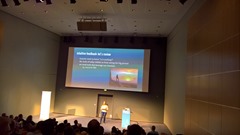by dotnetnerd
3. October 2016 11:49
Today I chose to take up an old advice and picked a track that was completely out of my comfort zone for the first day of GOTO. When jumping off the deep end you might as well do it completely, so I decided to go for a number of talks on Deep Learning Analytics.
I had high hopes because the first talk was an introduction to the subject called “what is it and what can it do for you”. Sadly the talk didn’t really do it for me, because it started out really theoretical, and Diogo Almeida seemed almost too passionate, which meant that he started speaking really fast and jumped between usecases, both current and some for the possible future.
No doubt the potential for neural networks that utilize deep learning is huge. Actually the second keynote of the day, about the comming robot revolution, also partly touched on the subject, showing what work is being done in robotics and especially in flying robots, and how they show promise in solving tasks in fields from agricultue (pun intended) to logistics and even playing a part in a Cirque de Soleil show.
Later I went to a talk by Julie Pitt, on how ideas taken from deep learning can teach us what our brains can teach about software development. This was quite interesting because we saw this recurring pattern of sencing –> applying a (generative) model –> doing actions –> testing/evaulating. This is what a lot of deep learning systems do, and it can be applied in a lot of areas.
The 3 concrete pieces of advice Julie gave was to take up:
- Property based testing
- Remedy first design
- intuitive feedback
Property based testing is a fairly well covered topic in software development by now. Remedy first design was new for me, but it is an approach where we look at how to sidestep when something bad happens and then look at it afterwards. So the idea is to have services return different actions like retry, redirect etc. so we avoid having too many exceptions types to hande and boil it down to fewer actions that can be done.
Intuitive feedback is the idea that we should look at intuitive ways of representing data, because logs are like seeing a movie one frame at a time through a keyhole and charts are often too hard to reason about. At the end she pointed to the Netflix Vizceral project, which is something I definitely need to look at.
